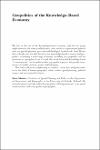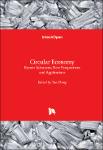Search
Author
- Ryozo, Himino (2)
- Tao, Zhang (2)
- Tetsushi, Sonobe (2)
- Alisher, Mirzabaev (1)
- next >
Subject
- Economics (6)
- Development economics (5)
- Management science (5)
- Economic History (3)
- next >
Date issued
Search Results
This open access book provides an in-depth examination of Japan's policy responses to the economic challenges of the 1980s and '90s. While MITI's earlier role in promoting rapid growth has been addressed in other studies, this volume, based on official records and exhaustive interviews, is the first to examine the aftermath of rapid growth and the evolution of MITI's interpretation of the economy's changing needs. Covering such topics as the oil shocks, trade conflict with the United States, and the rise and collapse of the so-called bubble economy, it presents a detailed analysis and evaluation of how these challenges were interpreted by government officials, the kinds of policies that were enacted, the extent to which policy aims were realized, and lessons for the longer term. Thi... |
We live in the era of the knowledge-based economy, and this has major implications for the ways in which states, cities and even supranational political units are spatially planned, governed and developed. In this book, Sami Moisio delves deeply into the links between the knowledge-based economy and geopolitics, examining a wide range of themes, including city geopolitics and the university as a geopolitical site. This book will prove enlightening to students, researchers and policymakers in the fields of human geography, urban studies, spatial planning, political science, and international relations. |
Nowadays, the restriction of resources and the environment is very severe. A circular economy is the only way to sustainable development, but how this works still needs more exploration. The series of studies carried out by the author are described in detail in this book. |
Since the mid-1980s, Japan, which was a leading competitor in the world’s manufacturing sector, tried to transform itself to an economy with domestic demand-led mature growth. The ensuing bubbles, busts, and banking crisis, however, left the country chronicle deflation and stagnation. This book analyzes why the Japanese authorities could not avoid making choices that led to this outcome. This report describes policy responses to the boom, bust, crisis, and recovery Japan experienced during the two decades from 1986 to 2004. One hundred and fifty years ago, Japan started to westernize itself after the two centuries of isolation. Since then, it has made two miracles and two major mistakes. |
Made in Africa presents the findings of original field research into the design, practice, and varied outcomes of industrial policy in different sectors in Ethiopia. The book explores how and why the outcomes of industrial policy are shaped by particular factors in different industries. The findings are discussed against the backdrop of ‘industrial policy’, which has recently found renewed favour among economists and international organizations, and of the history of thought about and practice in industrialization. The book seeks to learn from the failures and successes in the cement, leather and leather products, and floriculture sectors, all of them functioning under the umbrella of a single industrial strategy. Moreover, it argues that success lies in the interactions among polic... |
Part I: A power and systems approach: Systems thinking changes everything, Power lies at the heart of change, Shifts in social norms often underpin change. Part II: Institutions and the importance of history: How states evolve, The machinery of law, Accountability, political parties, and the media, How the international system shapes change, Transnational corporations as drivers and targets of change. Part III: What activists can (and can’t) do: Citizen activism and civil society, Leaders and leadership, The power of advocacy. Part IV: Pulling it all together: A power and systems approach to making change happen. |
This open access book asks why and how some of the developing countries have “emerged” under a set of similar global conditions, what led individual countries to choose the particular paths that led to their “emergence,” and what challenges confront them. If we are to understand the nature of major risks and uncertainties in the world, we must look squarely at the political and economic dynamics of emerging states, such as China, India, Brazil, Russia, and ASEAN countries. Their rapid economic development has changed the distribution of wealth and power in the world. Yet many of them have middle income status. To global governance issues, they tend to adopt approaches that differ from those of advanced industrialized democracies. At home, rapid economic growth and social changes put... |
This open access book provides a readable narrative of the bubbles and the banking crisis Japan experienced during the two decades between the late 1980s and the early 2000s. Japan, which was a leading competitor in the world’s manufacturing sector, tried to transform itself into an economy with domestic demand-led mature growth, but the ensuing bubbles and crisis instead made the country suffer from chronicle deflation and stagnation. The book analyses why the Japanese authorities could not avoid making choices that led to this outcome. The chapters are based on the lectures to regulators from emerging economies delivered at the Global Financial Partnership Center of the Financial Services Agency of Japan. |
A response is needed to the numerous issues spurred by the expansion of the gig economy, where flexible patterns of employment prevail in contrast to permanent jobs. In this context of the exponential growth of the digital economy and underlying business models the largest nationwide study of its kind into the impact of the working conditions in the UK music industry 'Can Music Make You Sick?' has been conducted by MusicTank/University of Westminster. This research suggests the need to consider the future of work not only from an economic or employment law perspective but from a mental health one too. What are the psychological implications of precarious work and how are factors such as financial instability, the feedback economy and personal relationships reflected in mental health... |
This collection highlights a key metaphor in contemporary discourse about economy and society. The contributors explore how references to reality and the real economy are linked both to the utopias of collective well-being, supported by real monies and good economies, and the dystopias of financial bubbles and busts, in which people’s own lives “crash” along with the reality of their economies. An ambitious anthropology of economy, this volume questions how assemblages of vernacular and scientific realizations and enactments of the economy are linked to ideas of truth and moral value; how these multiple and shifting realities become present and entangle with historically and socially situated lives; and how the formal realizations of the concept of the “real” in the governance of ec... |










